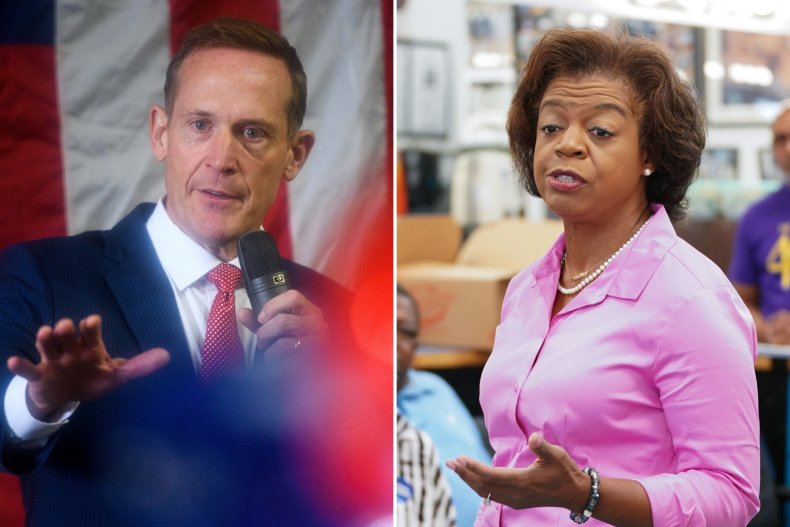Independent voters who remain undecided two weeks out from the midterm elections could potentially swing the U.S. Senate race in North Carolina.
A Marist Institute for Public Opinion poll released Wednesday shows that Republican Ted Budd and Democrat Cheri Beasley are tied among registered voters, both at 44 percent.
Beasley edged Budd among independent voters, 40 percent to 39 percent. However, 17 percent of independent respondents remain undecided and a 31-point gender gap exists, with 53 percent of men favoring Budd and 51 percent of women favoring Beasley.
About 10 percent of surveyed respondents said they were still undecided, but among those who definitely plan to vote, Budd has an advantage of 49 percent to Beasley’s 45 percent.
Each candidate is also nearly identical in terms of being viewed favorably, while about one in four registered voters surveyed said they had never heard of Budd or Beasley.
Of the 1,247 North Carolina adults polled from October 17 to 20, there were 1,130 registered voters. The margin of error was plus or minus 3.8 percentage points.
“The tale of the tape is all about turnout,” said Marist Director Lee M. Miringoff. “Both Budd and Beasley have a large following in the state for their candidacies but Beasley’s core group, especially younger voters and women, are not as likely to vote.”
Steven Greene, professor of political science at North Carolina State University, told Newsweek that given the pattern of national polls, it seems consistent that Budd would “have a reasonable but certainly not safe lead” in what he described as a purple state “with the slightest red tinge.”
The Real Clear Politics polling average has shown Budd with an average lead of approximately 4.5 percentage points, calling this race a “GOP hold.”
Democrats in the state have lost four consecutive Senate elections, Greene noted, including two that were close and two that were runaway victories. Democrats have had financial advantages in the close races, evident by the Senate Majority PAC, which is aligned with Senate Majority Leader Chuck Schumer, recently announcing a $4 million push for Beasley, viewed as an indication that the left believes it can win the race.
Greene said he would be surprised if independents broke at more than 60-40 once results conclude on Election Day.
“That’s not to say it can’t happen but kind of looking at the whole larger political context, I don’t necessarily see the scenario where voters break strongly for Beasley to put her over the top….Regardless of the history, when you have a race polling this close, it would be insane for Democrats not to invest in this race and give a go at it,” he said.

Melissa Sue Gerrits/Getty; Sean Rayford/Getty
Asher Hildebrand, associate professor of the practice in the Sanford School of Public Policy at Duke University, told Newsweek that he often makes the case “that most independents actually aren’t all that independent, and fewer still are undecided—so we shouldn’t overstate their significance in such a polarized environment.”
“But in a purple state like North Carolina, in a race where every vote may count, we could have a scenario where the proverbial undecided independent actually does make the difference,” he continued. “It’s astounding that this race continues to fly under the national radar despite coming down to the wire as the closest in the country—with the Senate majority potentially hanging in the balance.”
David Bateman, associate professor of government at the Jeb E. Brooks School of Public Policy at Cornell University, told Newsweek that Beasley’s hill is not too steep to climb even though the race certainly leans in the GOP’s favor.
“Undecideds usually often break the way that the way the electorate itself is breaking,” Bateman said. “The question is, do they look much more Republican or much more Democrat, or do they look broadly similar to the general electorate?”
Issues like abortion will mobilize voters with professional backgrounds, he added, as well as Black voters. He said spending money in these kinds of races is essential because it forces the opposition party to spend as well.
The question becomes whether issues like “a weird economy” with record-high inflation but low unemployment will reign supreme over issues like reproductive rights and the response to January 6, he said.
“Is it enough to overcome?” Bateman said. “I expect it won’t be totally, but it will help mitigate that.”
The Beasley campaign said in a statement that independents are “a critical voting bloc in North Carolina” due to one-third of the state’s voters being registered as unaffiliated to either main political party.
“This race is neck and neck 13 days out from Election Day because voters know that Cheri is the only candidate in this race that will put people first while Congressman Budd has spent six years focused on helping himself and his corporate donors at the expense of North Carolinians,” said Dory MacMillan, communications director for Beasley.
Newsweek reached out to the Budd campaign for comment.
reference: www.newsweek.com
